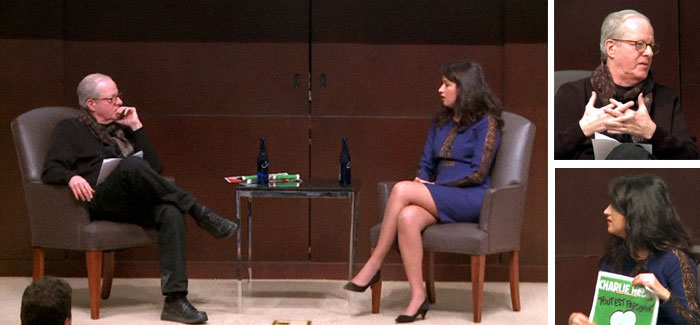
Morrissey and El Rhazoui discuss Charlie Hebdo and free expression at “Who is Charlie?,” hosted by the University of Chicago French Club. (Video stills from “Who Is Charlie? Charlie Hebdo Journalist Zineb El Rhazoui on Freedom of Expression.”
Surviving Charlie Hebdo journalist Zineb El Rhazoui says not everyone can be Charlie.
After two gunmen stormed the Paris offices of Charlie Hebdo on January 7, killing 12 people in apparent retaliation for the satirical newspaper’s depictions of the prophet Mohammed, a slogan of solidarity, “Je suis Charlie,” cropped up on social media sites, at free speech rallies and vigils, and in newspapers around the world.
On February 26, a packed Law School auditorium crowd heard Charlie Hebdo columnist Zineb El Rhazoui’s perspective on what it means to be Charlie.
Charlie Hebdo is part of a long French tradition of satirical newspapers, El Rhazoui said during the high-security event, hosted by the University of Chicago French Club. As early as the French Revolution, newspapers used cartoons—more accessible to the majority of Frenchmen than written articles—to lampoon political figures like Marie Antoinette. (“They depicted her as …,” El Rhazoui trailed off before soliciting a translation from moderator Robert Morrissey, the Benjamin Franklin Professor of French Literature. “A whore,” he supplied.)
Satire is about criticizing power, said El Rhazoui, which makes religion an obvious—and necessary—target. “It is our job as a satiric newspaper” to criticize influential ideologies, she said. “If I criticize Islam, it is my right, it is my freedom of speech, and I think even it is my duty as a journalist.”
At Charlie Hebdo, this sense of duty includes the right to blaspheme. In his introductory remarks, Geoffrey R. Stone, JD’71, the Edward H. Levi Distinguished Service Professor at the Law School, said there is “no doubt” the images of the prophet Mohammed in the newspaper constitute blasphemy. (For many Muslims any visual depiction of the prophet is blasphemy, a form of idol worship.)
El Rhazoui defended Charlie Hebdo’s right to publish blasphemous images, noting that the paper operates under French laws and laïcité, or the absence of religion in French public life. “We work under the French code, not under Sharia [law],” she said. “What is sacred for certain people is not sacred for us.”
More importantly, “we mustn’t as a journalistic team accept the rules of debate that are imposed [on] us by guns,” said El Rhazoui. ISIS and similar groups are unlikely to be satisfied by merely intimidating satirical publications into not publishing images of Mohammed, she said. “Once they’re sure no one will draw the prophet again, they’ll find another target.”
El Rhazoui does not expect everyone to “be Charlie.” Being Charlie means not only being willing to draw a blasphemous cartoon but being willing to die for that cartoon, she said. “Not everyone ... has the balls to die for his ideas. Not everyone can be Charlie Hebdo.”
Two days after the attack, El Rhazoui and the other surviving staff members gathered in borrowed office space to create what would be called the “survivor’s issue” of Charlie Hebdo. “We were crying, we were happy to see each other, ... and we just wanted to work immediately to make this issue.”
Before the attack, Charlie Hebdo had fewer than 10,000 subscribers; it now has more than 200,000. The “survivor’s issue” sold more than seven million copies. “It’s a change for us,” said El Rhazoui.
“Of course, all of us, we would have preferred to stay poor and have [our] friends, rather than paying the very expensive price that we paid.”
Video
Who Is Charlie? Charlie Hebdo journalist Zineb El Rhazoui on the freedom of expression.
